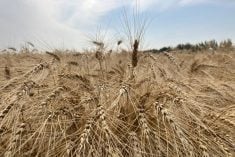Paris | Reuters – France unveiled on Monday a revised plan to halve pesticide use in the European Union’s biggest agricultural producer, pledging to adopt an EU indicator and boost research into alternatives in a nod to grievances voiced in farmer protests this year.
Why it’s important
Environmental regulation was one of the main factors behind protests that swept France and parts of Europe, unsettling governments in the run-up to European elections. The French authorities have responded with extra aid and plans to simplify environmental rules, echoing steps taken at EU level. Ecology associations have attacked a watering down of European standards.
Read Also

U.S. livestock: Feeder cattle hit contract highs on tight supply
Chicago | Reuters – All Chicago Mercantile Exchange feeder cattle futures and most live cattle futures hit contract highs on…
By the numbers
The new plan aims to halve pesticide use by 2030 compared to the 2011-2013 period on the basis of an EU indicator, called HRI1, which takes into account the chemical’s toxicity. The previous indicator, called NODU, applied by France simply calculated the volume of pesticides per hectare.
Under the new indicator, France has already achieved a reduction of about 30 per cent, the government says.
France will devote nearly 150 million euros ($161.66 million) this year to research into alternatives. It will also invest 50 million euros on new equipment.
Context
The “Ecophyto” policy was launched in 2009 but the objective of halving pesticide use within a decade was pushed back as volumes increased. Farmers argue that the banning of some pesticides forced them to use more of less effective ones, while adverse weather also led them to increase volumes.
The government aims to avoid a repeat of previous setbacks. Sugar beet growers have notably endured disease losses after a ban on neonicotinoid pesticides.
















